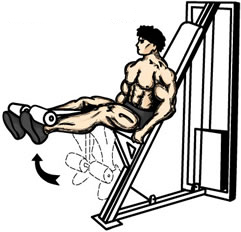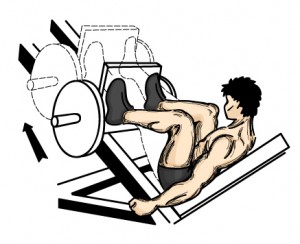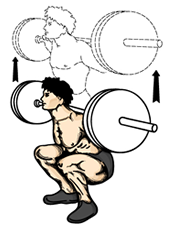Last week I talked about how the Leg Press could be doing more harm than good in part 1 of a 5 part series of exercises to avoid. This week, I will continue on to the second exercise and offer a more effective alternative.
The second exercise I would like to talk about is the Leg Extension.
 The Leg Extension is another popular exercise in the gym. Even though this exercise does have some benefit in that it isolates the quadriceps to improve definition, overall it’s not really giving you the benefits that a different exercise would.
The Leg Extension is another popular exercise in the gym. Even though this exercise does have some benefit in that it isolates the quadriceps to improve definition, overall it’s not really giving you the benefits that a different exercise would.
First of all, from a muscle balance perspective, the glutes are not being used effectively. The quadriceps and glutes should be used as a pair. Also, your hamstrings are not being used either so you are going to be primarily working your quadriceps. Overdeveloped quadriceps can lead to knee pain or even an ACL injury. (ACL stands for Anterior Cruciate Ligament and is one of the four major ligaments of your knee)
Also, there is no real functional benefit to doing the Leg Extension. In every day activities you are walking, sitting, and standing which use the quadriceps, hamstrings, and glutes. With the Leg Extension, you are just using your quadriceps and this won’t help much in your daily life.
Finally, like the Leg Press, the Leg Extension has a very low metabolic effect. This is a single joint exercise that is isolation based. Less muscles used in an exercise = lower metabolic rate. Your metabolic rate or metabolism is the amount of calories your body burns while at rest. The higher your metabolic rate, the higher the amount of calories you burn which will ultimately lead to a leaner body so try to choose an exercise that involves two or three muscle groups working together.
So what is a more effective exercise than the Leg Extension?
You can do a barbell or dumbbell squat like I mentioned in part 1 of this series or another exercise you can do is the Lunge.
Below is a video demonstration of the Reverse Lunge which I am putting up as the Home Exercise of the Week as well. The Reverse Lunge is a little safer on your knees than a forward lunge but it does require some balance. The reverse motion is a little safer because it takes some of the pressure off your knees since your body weight is moving backwards and away from your knee cap.
When performing the Reverse Lunge, make sure to bring both legs to 90 degree angles. When you are coming up out of the movement, you want to make sure you are pushing up through your front heel and don’t let your knee go beyond your toes. Always keep your upper body in an upright position (no bending over or leaning forward). If you have trouble balancing with this exercise, start by holding on to a chair or put your hand on a wall to stabilize yourself.
So there you have the second exercise to avoid next time you hit the gym. Try adding a body weight or weighted lunge instead for a much more effective workout that will provide you with functionality and muscle balance while burning more calories!
Stay tuned next week for a third exercise to avoid and it’s more effective alternative!


